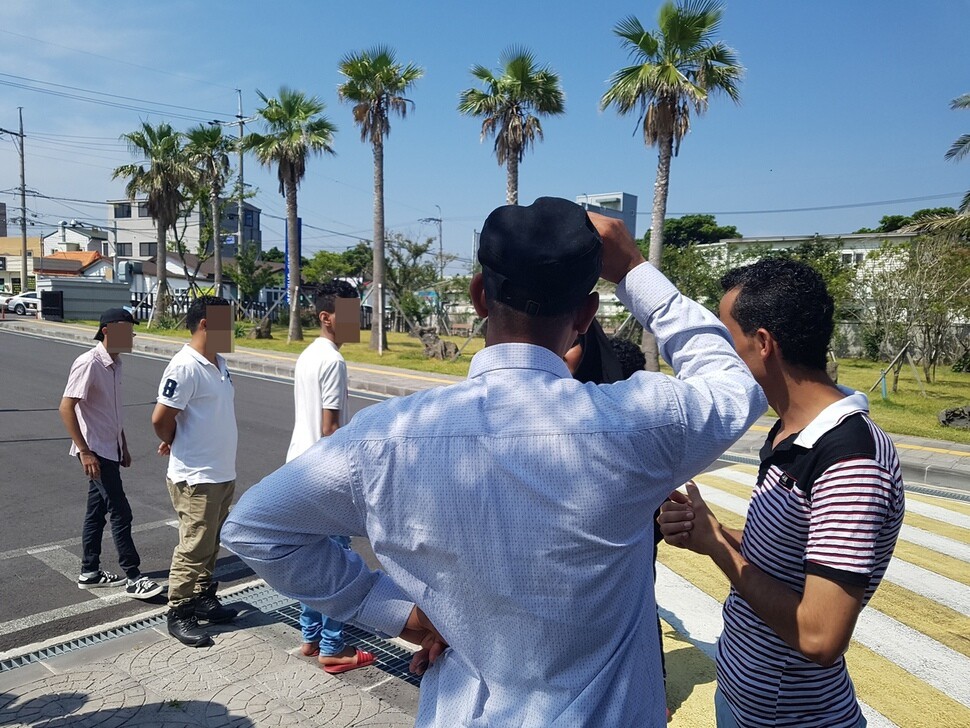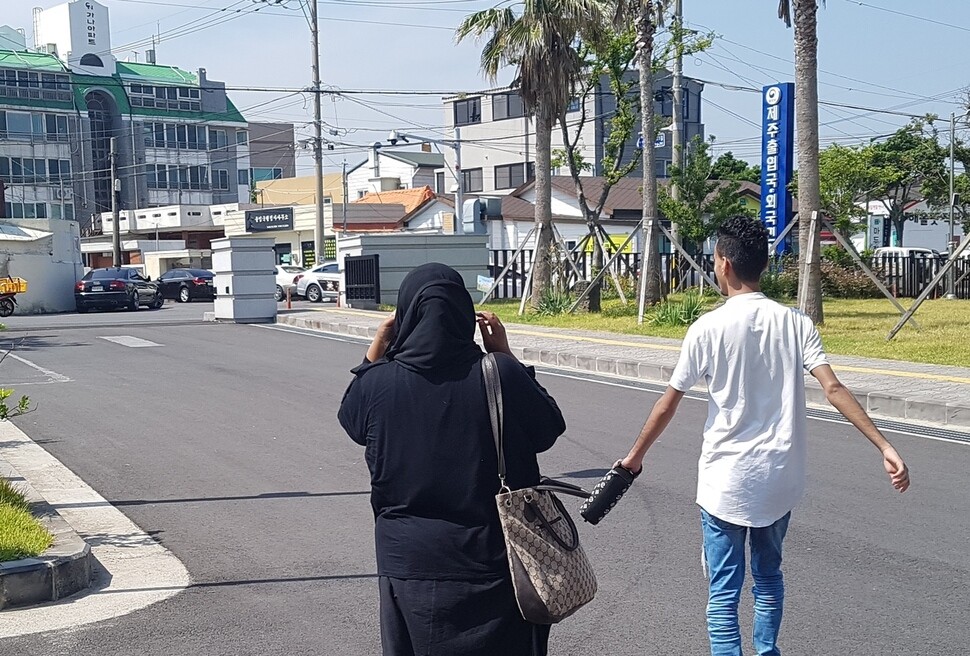hankyoreh
Links to other country sites 다른 나라 사이트 링크
Jeju immigration authorities begin reviews of Yemeni refugee applicants

The Jeju Immigration Office began reviews on June 25 for refugee status applications by Yemeni nationals, which have recently become the topic of heated debate.
Meeting with reporters that day, Jeju Immigration Office director Kim Do-gyun explained, “The three refugee review offices at the Jeju Office will be able to conduct reviews for two to three people a day.”
“The decision on refugee status will be based on an objective, fair, and rigorous review. There are 486 Yemeni candidates for refugee status reviews, and the overall review period is expected to last between six and eight months,” Kim added.
A total of 549 Yemeni nationals have applied for refugee status in Jeju. The others not included among the 486 candidates appear to have relocated to different regions prior to the placement of restrictions on the Yemenis’ travel to the mainland, and are expected to undergo reviews in the regions in question.
Once a refugee applicant has undergone review, a decision is typically made within one month, and applicants are individually informed of the result. Possible review outcomes include denials and recognitions of refugee status and “humanitarian sojourn” status; applicants receiving denial or humanitarian sojourn decisions are allowed to file an objection and/or take legal action. Forty-two Yemenis applied for refugee status last year; none were recognized, although some were granted humanitarian sojourn status.

Decisions regarding restrictions on mainland travel from Jeju also depend on the review outcomes. For applicants recognized as refugees or receiving humanitarian sojourn status, the likelihood of the ban being lifted is high. On June 1, three Yemeni refugee applicants filed suit against the Jeju Immigration Office at Jeju District Court to demand that the restriction on permitted sojourn regions be overturned. According to the applicants, the blanket ban on mainland travel for all Yemeni refugee applicants is unconstitutional because it was not submitted to legal procedures and applies vague standards.
Indeed, the restriction, which was imposed on Apr. 30, has been a source of consternation and disappointment for the Yemenis.
“In Yemen, we were not free to move around because of the civil war, and now it’s the same situation in Jeju,” said one, adding that the mainland travel restriction had “come as a shock to the Yemenis.”
Another Yemeni nearby described Jeju as being “like a little prison.”
The Yemenis who spoke to The Hankyoreh near the Jeju Immigration Office on the first day of refugee status reviews shared different accounts of gratitude toward and frustration with their life in Jeju. Rezilah, a 34-year-old applicant who works at a Jeju coffee shop on the weekends, smiled as she talked about the many well-meaning South Koreans she has encountered.
“Many Jeju residents have helped us, including South Korean women who have offered us a place to stay. I feel grateful,” she said.
At the same time, Rezilah said that “all Yemenis hope to return home once the situation in Yemen improves.”
“We have family there. That’s where our lives are,” she said.
Muhammad, a 34-year-old who arrived in Jeju on Apr. 30, quit a job at a fish farm after four days. With a wife and five children back home in Yemen, he said, “I miss my children at every moment.”
Hassan, 38, and Kram [sp?], 30, worked on a fishing boat before they were abruptly fired after eight days.
“It was my first time working on a boat, so I felt seasick and dizzy, but I did my best,” said Hassan. “One person made a mistake, and they told everyone to leave.”
Teenaged Yemenis have been despondent, being unable to either work or go to school.
“I can’t work because I’m a minor,” lamented a 17-year-old named Yosef. Yosef, who arrived in Jeju by way of Egypt and Malaysia, also visited the Jeju Immigration Office that day but was unable to find work. Because of his refugee applicant status, he can neither attend school nor visit a job training center. The teenaged Yemenis appeared condemned to hover in the margins of Jeju society until their refugee status outcome arrives.
By Huh Ho-joon, Jeju correspondent
Please direct comments or questions to [english@hani.co.kr]

Editorial・opinion
![[Editorial] Does Yoon think the Korean public is wrong? [Editorial] Does Yoon think the Korean public is wrong?](https://flexible.img.hani.co.kr/flexible/normal/500/300/imgdb/original/2024/0417/8517133419684774.jpg) [Editorial] Does Yoon think the Korean public is wrong?
[Editorial] Does Yoon think the Korean public is wrong?![[Editorial] As it bolsters its alliance with US, Japan must be accountable for past [Editorial] As it bolsters its alliance with US, Japan must be accountable for past](https://flexible.img.hani.co.kr/flexible/normal/500/300/imgdb/original/2024/0417/6817133413968321.jpg) [Editorial] As it bolsters its alliance with US, Japan must be accountable for past
[Editorial] As it bolsters its alliance with US, Japan must be accountable for past- [Guest essay] Amending the Constitution is Yoon’s key to leaving office in public’s good graces
- [Editorial] 10 years on, lessons of Sewol tragedy must never be forgotten
- [Column] A death blow to Korea’s prosecutor politics
- [Correspondent’s column] The US and the end of Japanese pacifism
- [Guest essay] How Korea turned its trainee doctors into monsters
- [Guest essay] As someone who helped forge Seoul-Moscow ties, their status today troubles me
- [Editorial] Koreans sent a loud and clear message to Yoon
- [Column] In Korea’s midterm elections, it’s time for accountability
Most viewed articles
- 1[Column] The clock is ticking for Korea’s first lady
- 2Samsung barricades office as unionized workers strike for better conditions
- 3[Editorial] When the choice is kids or career, Korea will never overcome birth rate woes
- 4[News analysis] After elections, prosecutorial reform will likely make legislative agenda
- 5S. Korea, Japan reaffirm commitment to strengthening trilateral ties with US
- 6Why Israel isn’t hitting Iran with immediate retaliation
- 7[Guest essay] How Korea turned its trainee doctors into monsters
- 8Japan officially says compensation of Korean forced laborers isn’t its responsibility
- 9[Editorial] Does Yoon think the Korean public is wrong?
- 10[Editorial] 10 years on, lessons of Sewol tragedy must never be forgotten